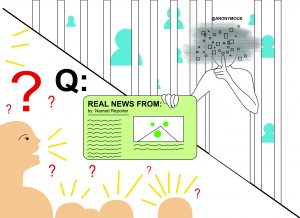Following The New York Times’ publication of an anonymous opinion editorial titled “I Am Part of the Resistance in the Trump Administration,” frenzied speculation about the author’s identity has covered newspapers, social media and nearly every other platform of public debate. One resurfacing criticism in this sea of coverage concerns anonymous sources, and not without reason. The recent op-ed is just one of many pieces that have emerged over the past year showing the president in an unflattering light, and without the source’s name attached.
Never one to turn the other cheek, Trump has denounced the unnamed source’s criticisms as “fake.” While criticizing the president is certainly easy, the issue of anonymous sources should be examined separately from Trump himself. Trump may preoccupy every bit of media coverage in Washington right now, but one day he will not. Anonymous sources will always be important to the functioning of the free press, no matter who sits in the Oval Office.
In fact, some of the most important events in U.S. history, like the publication of the Pentagon Papers or the Watergate scandal, involved journalists using confidential sources. These exposes brought about necessary changes that were in the interest of the American people, and they would not have happened without the promise of confidentiality to the source. Believe it or not, most people, especially those in powerful positions or at the mercy of those in powerful positions, are not willing to share information when their livelihood is at stake. In cases like The New York Times op-ed, the best the publication can do is thoroughly vet the author and be absolutely clear about the source’s legitimacy, which the editors at that paper did. Even on a smaller scale, there can be ethical reasons for withholding a source’s name, such as in the testimonies of rape victims. While the ethical principles involved in not naming sources often are justifiably questioned, there are situations in which doing so is just the decent thing to do.
When a reporter promises to protect a source, that relationship is built on trust, and without that trust, some of the most important reporting of this century would not have been possible. Journalists prove their credibility by reporting accurately on issues that matter, and while naming sources makes the information seem more legitimate, that fact is countered by another: a journalist who exposes a confidential source is done for in investigative reporting. Once a reporter or editor rats out a source, he or she will not be approached again by a person willing to leak sensitive information.
A reporter who is approached by a source wishing to remain anonymous is in a difficult position. Even if the source does not want to be identified, the information may still be valuable, and even more so if, like has happened in recent months, that information is coming from someone in a position of authority. One option is to protect the source’s identity completely, and risk that source being doubted by readers. Another is to withhold the source’s name but to provide some background that lends credibility, such as stating the person’s career position or social rank. A third option is to find the information from a source that is willing to go on the record, which is, of course, not always possible.
It would be great if every source went on the record. It also would be great if chocolate cured pancreatic cancer or if Oprah worked for FAFSA. Many things in the universe simply do not function the way the general public would like them to. Anonymous sources are not preferable for politicians, readers or even journalists. But when faced with the choice of accepting important information from a source who refuses to go on the record or rejecting the source and the important information, every journalist who values public awareness will choose the former.
Credibility is everything to a journalist, except for one thing that surpasses it—the truth. Delivering the information to the public is more important. It is the reason journalism exists, no matter how much criticism it endures from powerful people who despise it, and from the everyday Americans it exists to serve.









